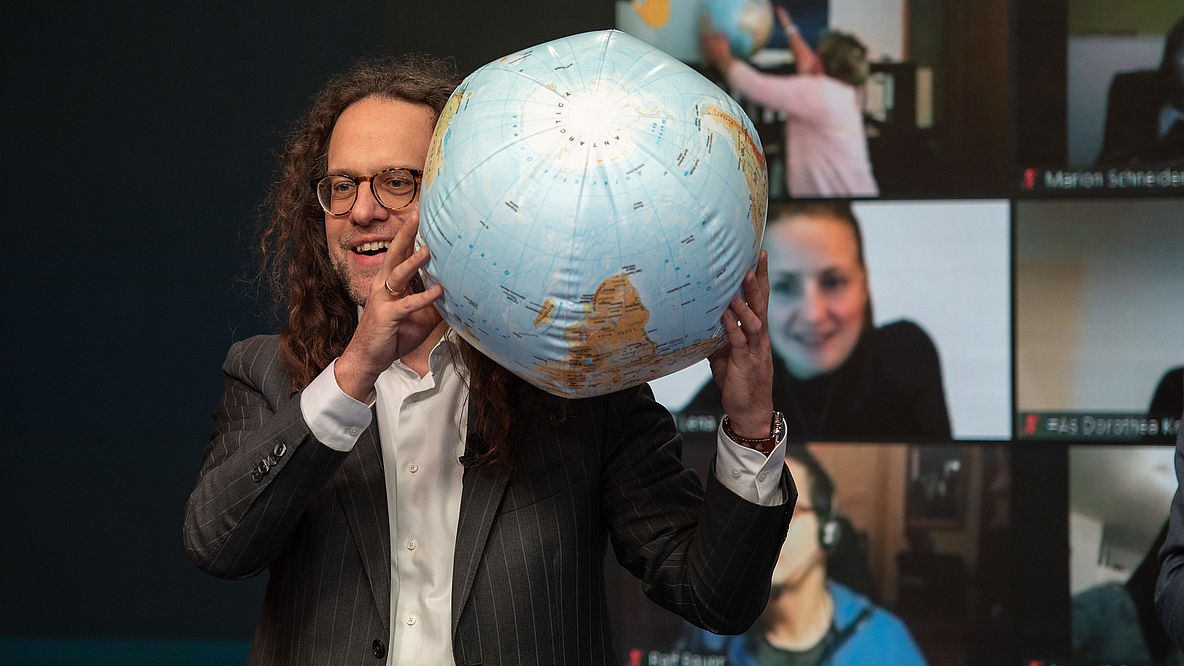Results of the Citizens' Assembly "Germany's Role in the World" have been determined

The Citizens' Assembly on Germany's Role in the World, which was organized under the patronage of the President of the Bundestag Wolfgang Schäuble, adopted its recommendations on foreign policy on Saturday (20 February). After 50 hours of deliberation over ten sessions, the 154 randomly selected participants formulated guidelines on Germany's presence in the world. These recommendations will now be compiled into a Citizens' Report by 19 March.
"1. We see Germany's role in the world in the future as that of a fair partner and mediator, who works together with others, especially with the EU, to shape a world in which also future generations can live a good and self-determined life.
2. To this end, we are committed to global sustainability, climate protection and the protection of human rights, the rule of law, peace and security.
3. We want to face up to our responsibility to achieve these goals by acting transparently and with foresight and by living up to our own aspirations.
4. If we do this in an innovative and inspiring way at home, learning from each other in a self-critical way and acting consistently, we can become a role model for others."
These were the core statements of the participants after an intensive debate on Saturday.
Looking back on the Citizens' Assembly, Chair person Marianne Birthler says: "The word responsibility played an important role. No one shouted 'Germany first'. The importance and meaning of our past was clearly heard thoughout. However, another important message that came up repeatedly in the course of the Citizens' Assembly was: Germany does not have to hide and should stand up more confidently for its values in the world, especially on the issues of human rights, sustainability and democracy."
"The citizens have really mastered it, but the test could not have been more difficult," said Claudine Nierth, spokesperson for the board of the association Mehr Demokratie, which initiated the process together with the initiative Es geht LOS. "The topic requested by the Bundestag is very broad and multi-layered. We have taken up this challenge and the people who were drawn to take part today have decided on a considerable collection of recommendations on foreign policy, which the Bundestag can now take up to work with."
In the course of the online Citizens' Assembly, participants worked to define Germany's role and how it can have a concrete impact on policy both in small working groups and in plenary sessions. Different concepts of this role were elaborated by the moderators, an illustrator and with the help of an online platform that was designed specifically for the Assembly.
The question of Germany's role in the world was discussed along five thematic fields: sustainable development, peace and security, economy and trade, democracy and the rule of law, and the European Union. The people drawn by lot worked on these topics in fixed "travel groups". Each person who was selected focused on one of these five topics, but also returned for regular sessions to report back and exchange with all participants. A total of 32 recommendations were developed for the five thematic fields and will also be included in the Citizens' Report.
"We are convinced that the Citizens' Assembly as an instrument is suitable to expand and strengthen our parliamentary democracy," Nierth sums up. "After this second Citizens' Assembly, we can come to the conclusion that the more concrete and specific an issue is, the more deeply a Citizens' Assembly can discuss its dilemmas and therefore provide more application-oriented and implementable answers." The Citizens' Assembly has definitely succeeded in building a bridge between politics and the population, "We already have received feedback from all political groups that they are willing to take up the results."
In the coming weeks, the implementing institutes, supported by an editorial team made up out of participants of the Assembly, will compile the results into a Citizens' Report that will be presented to the Bundestag on 19 March. At the same time, a team from IASS (Institute for Advanced Sustainability Studies) and IDPF (Institute for Participation and Democracy Research at the University of Wuppertal) will prepare an evaluation report.
+++ Background +++
The Citizens' Assembly was initiated by the association "Mehr Demokratie" and the initiative "Es geht LOS". It is organised by the associated companies IFOK, IPG and Nexus. In addition to the topic of foreign policy proposed by the Bundestag's Council of Elders, the aim is to test the Citizens' Assembly as a policy-making instrument and to develop a format suitable for the German federal level. Of the original 169 participants, 15 have had to leave the Citizens' Assembly since its launch because of time, technical or health reasons, so that there are currently 154 participants who have been drawn by lot.